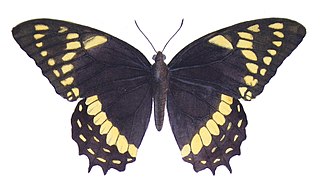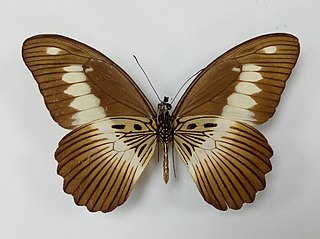
Papilio is a genus in the swallowtail butterfly family, Papilionidae, as well as the only representative of the tribe Papilionini. The word papilio is Latin for butterfly.

Swallowtail butterflies are large, colorful butterflies in the family Papilionidae, and include over 550 species. Though the majority are tropical, members of the family inhabit every continent except Antarctica. The family includes the largest butterflies in the world, the birdwing butterflies of the genus Ornithoptera.

The large skipper is a butterfly of the family Hesperiidae.

Papilio nephelus is a species of swallowtail butterfly belonging to the family Papilionidae. Subspecies include P. n. chaon, the yellow Helen, and P. n. sunatus, the black and white Helen.

The eastern giant swallowtail is the largest butterfly in North America. It is abundant through many parts of eastern North America; populations from western North America and down into Panama are now considered to belong to a different species, Papilio rumiko. Though it is often valued in gardens for its striking appearance, its larval stage can be a serious pest to citrus farms, which has earned its caterpillars the names orange dog or orange puppy. The eastern giant swallowtail caterpillars possess remarkable camouflage from predators by closely resembling bird droppings. They use this, along with their osmeteria, to defend against predators such as wasps, flies, and vertebrates.

The Oregon swallowtail is a subspecies of swallowtail butterfly native to the United States of America, Oregon, Washington, and Idaho and south-central British Columbia in Canada. In 1976, it became one of the first four butterflies that the United States Postal Service placed on a U.S. stamp.

Papilio eurymedon, the pale swallowtail or pallid swallowtail, is a relatively common swallowtail butterfly found throughout much of the western North America. The species was first described by Hippolyte Lucas in 1852. It is found on the Pacific coast from northern Baja California to southernmost British Columbia, and inland to New Mexico and the Black Hills of South Dakota. It is present from the coast to western Montana, and from Wyoming to northern New Mexico. It is absent from most of Nevada and western Utah. It prefers open woodlands and forest clearings, especially near permanent bodies of water such as ponds, but also urban parks and is occasionally seen in suburban areas. Though not as common as the western tiger swallowtail, the pale swallowtail can be seen in large numbers at puddling parties where up to a dozen or more males may be gathered. There they join other species to sip water from damp soil to obtain nutrients for mating. Their appearance is quite similar to that of the western tiger swallowtail, except they are a white-cream colour or very pale yellow. Some pale swallowtails also have differing amounts of red-orange patches on the top of the wings just above the tail. There is a submarginal band on the bottom of the hindwings. Tiger stripes and borders are thicker than those of western tiger swallowtails. The wingspan is typically 3.5 to 4.5 inches.

Papilio rumanzovia, the scarlet Mormon or red Mormon, is a butterfly of the family Papilionidae. It is found in the Philippines but has been recorded as a vagrant to southern Taiwan.

Papilio macilentus, the long tail spangle or maculaturoviy macilentus's swallowtail, is a butterfly of the family Papilionidae. The species was first described by Oliver Erichson Janson in 1877.

Bungalotis is a genus of Neotropical butterflies in the family Hesperiidae (Eudaminae), in which they are placed to genus Phocidini.

Papilio deiphobus is a species of swallowtail butterfly in the Papilioninae subfamily. It is found from the Mollucas to Sulawesi in Indonesia.

Papilio menatius is a butterfly of the family Papilionidae.

Papilio euchenor is a butterfly of the family Papilionidae.

Papilio albinus is a species of swallowtail butterfly from the genus Papilio that is found in west Western New Guinea and Papua New Guinea. The species was first described by Alfred Russel Wallace in 1865.

Papilio filaprae is a species of swallowtail butterfly from the genus Papilio that is found in Cameroon, the Democratic Republic of the Congo, the Republic of the Congo, Angola and Equatorial Guinea. The species was first described by Ernst Suffert in 1904.

Papilio inopinatus is a species of swallowtail butterfly from the genus Papilio that is found in Romang, Babar, Damar and Tanimbar.

Papilio zenobia, the Zenobia swallowtail or Volta swallowtail, is a species of swallowtail butterfly from the genus Papilio that is found in Guinea, Sierra Leone, Liberia, Ivory Coast, Ghana, Nigeria, Cameroon, Equatorial Guinea, the Republic of the Congo and Uganda. It was first described by Johan Christian Fabricius in 1775. The habitat consists of wetter forest in good to reasonable condition.

Monoloxis flavicinctalis is a species of snout moth in the genus Monoloxis. It was described by Jan Sepp in 1852, and is known from Suriname and Brazil.

Jan Sepp (1778–1853) was a Dutch entomologist.



















